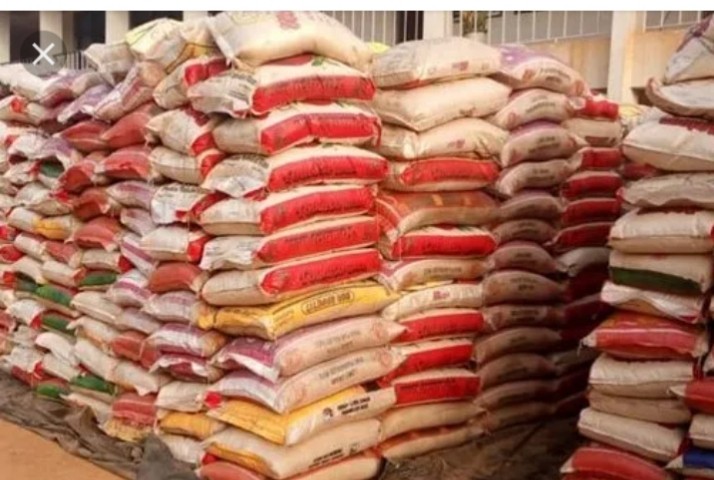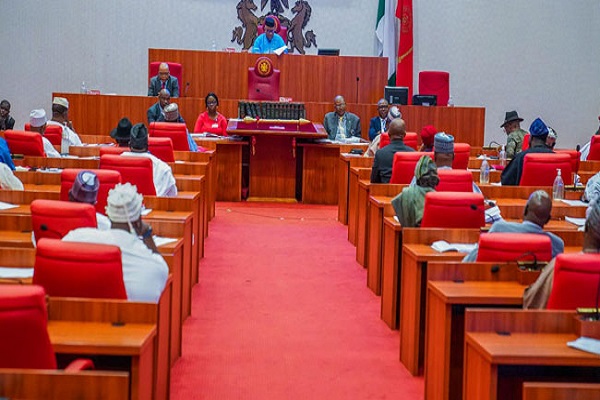News
Nigeria To Import 2.1 Million Metric Tons Of Rice, Become Top Buyer Globally

Nigeria is projected to import 2.1 million metric tons of rice in 2024, which may make the country the top rice buyer globally.
This is according to the latest Rice Outlook report by the Economic Research Service of the U.S. Department of Agriculture (USDA).
The report notes that global rice trade will hit about 52.85 million tons (milled basis) by 2024, with more exports expected from Brazil and South Korea, and more imports expected from Burkina Faso, Indonesia, and Nigeria.
It read:
“Global rice trade in the calendar year 2024 is projected at 52.85 million tons (milled basis), up 345,000 tons from the previous forecast but 460,000 tons smaller than the year-earlier revised forecast of 53.3 million tons. Export forecasts for 2024 are raised for Brazil and South Korea, while import forecasts are raised for Burkina Faso, Indonesia, and Nigeria, with Indonesia’s import forecast raised 600,000 tons to 2.0 million tons.”
Weaker Crops in Nigeria
According to the report, weaker rice production is expected in Nigeria and seven other countries.
The report noted:
“Rice production is projected to continue to decline in Japan and South Korea due to diet diversification and declining and aging populations. Weaker crops are also projected in 2023/24 for Costa Rica, Ecuador, Mali, Nigeria, Turkey, and Uzbekistan.”
It added that global rice production in 2023/24 is projected at a record 517.8 million tons (milled basis), which is a decrease of 340,000 tons from last month’s forecast but 4.4 million tons larger than a year earlier.
Out of the projected rice production figure, Nigeria is expected to produce about 5.23 million tons.
Top rice importer
Data from the report also showed that Nigeria will likely be the leading importer of rice in 2024.
The country will be followed by Indonesia with an import projection of 2 million metric tons and Brazil with a projection of 900,000 metric tons.
It noted that the import forecast for Nigeria was raised by 100,000 metric tons from the earlier projection in October.
On the reason for the increase, the report noted: “Import forecast is raised based on stronger-than-expected demand for imported rice due to both high prices for domestic rice and quality concerns.”
More insight
The Central Bank of Nigeria (CBN) recently lifted the foreign exchange restrictions it placed on importers of rice and 42 other items eight years ago.
This will likely encourage the importation of more rice, among other items, into the country.
There have been mixed reactions following the removal of the restrictions, with some farmers recently showing support for the lifting of the foreign exchange ban on rice importation.
According to this group of farmers, the lifting of the forex ban breaks the monopoly of the processing and marketing of grain by local millers.
Prior to the bank, there appeared to be a decrease in rice import, with data from the Thai Rice Exporters Association (TREA), showing a decrease of 98.4% between the first seven months of 2022, and that of 2021.
However, there is also a likelihood that foreign rice is likely smuggled more than it is officially imported into the country.
About a week ago, the Nigeria Customs Service said it seized 13 trailer loads of foreign parboiled rice, among other items.
Headline
Prince Harry visits sick Nigerian soldiers in Kaduna

Prince Harry and his team visited the 44 Nigerian Army Reference Hospital in Kaduna to interact with wounded soldiers who are receiving treatment.
The Duke of Sussex is in Nigeria with his wife to champion the Invictus Games, which Harry founded to aid the rehabilitation of wounded and sick servicemembers and veterans.
Nigeria joined the Invictus Community of Nations in 2022 becoming the first African country to join.
Prince Harry’s visit to Kaduna came 68 years after his late grandmother Queen Elizabeth II visited the state during the time of the late Premier of Northern Region Sir Ahmadu Bello.




News
Senate approves death penalty for drug traffickers

Senate on Thursday, May 9, approved the death penalty for those convicted on the charge of drug trafficking in the country.
The punishment prescribed in the extant NDLEA Act is a maximum sentence of life imprisonment.
The resolution of the Senate followed its consideration of a report of the Committees on Judiciary, Human Rights and Legal Matters and Drugs and Narcotics, National Drug Law Enforcement Agency (NDLEA) Act (Amendment) Bill, 2024.
The Chairman of the Committee on Judiciary, Human Rights & Legal Matters presented the report during plenary, Senator Mohammed Monguno (APC-Borno North).
The bill, which passed its third reading, aims to update the list of dangerous drugs, strengthen the operations of the NDLEA, review penalties, and empower the establishment of laboratories.
Section 11 of the current act prescribes that “any person who, without lawful authority; imports, manufactures, produces, processes, plants or grows the drugs popularly known as cocaine, LSD, heroin or any other similar drugs shall be guilty of an offence and liable on conviction to be sentenced to imprisonment for life” was amended to reflect a stiffer penalty of death.
Although the report did not recommend a death penalty for the offence, during consideration, Senator Ali Ndume moved that the life sentence should be upgraded to the death penalty.
During a clause-by-clause consideration of the Bill, Deputy Senate President Barau Jibrin, who presided over the session, put the amendment on the death penalty to a voice vote and ruled that the “ayes” had it.
But Senator Adams Oshiomhole objected to the ruling, saying that the “nays” had it.
He argued that matters of life and death should not be treated hurriedly, but Barau said it was too late, as he failed to call for division immediately after his ruling.
The bill was subsequently read for the third time and passed by the Senate.
-

 Headline2 days ago
Headline2 days agoSuspend cybersecurity levy– Reps to CBN
-

 Headline2 days ago
Headline2 days agoTinubu resumes work after foreign trip
-

 Business2 days ago
Business2 days agoNigeria needs over $2bn to revive Ajaokuta Steel Plant, says Minister
-

 News2 days ago
News2 days agoShan George’s money returned to Zenith Bank account
-

 Entertainment3 hours ago
Entertainment3 hours agoAMVCA Cultural Day: BBNaija’s Neo, Venita win Best Dressed Male, Female
-

 Metro3 hours ago
Metro3 hours agoEx-Sports Minister laments after hospital neglected him for hours over N80000 deposit
-

 Headline3 hours ago
Headline3 hours agoPrince Harry visits sick Nigerian soldiers in Kaduna



